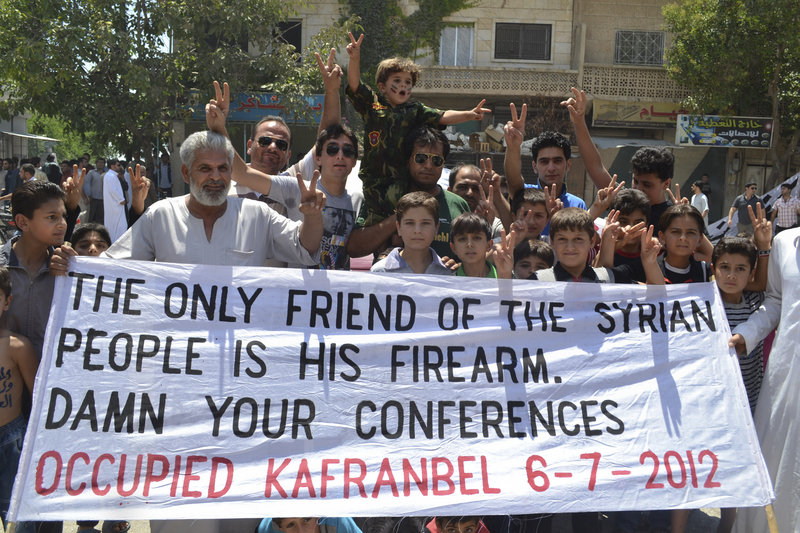BEIRUT – Special U.N. envoy Kofi Annan acknowledged in an interview published Saturday that the international community’s efforts to find a political solution to the escalating violence in Syria have failed.
Annan also said that more attention needed to be paid to the role of longtime Syrian ally Iran, and that countries supporting military actors in the conflict were making the situation worse.
“The evidence shows that we have not succeeded,” he told the French daily Le Monde.
Annan, the special envoy for the United Nations and the Arab League, is the architect of the most prominent international plan to end the crisis in Syria, which activists say has killed more than 14,000 people since March 2011.
His six-point plan was to begin with a cease-fire in mid-April between government forces and rebels seeking to topple the regime of President Bashar Assad. But the truce never took hold, and now the almost 300 U.N. observers sent to monitor the cease-fire are confined to their hotels because of the escalating violence.
Activists reported more than 50 people killed Saturday alone, after some 800 people the last week of June.
Annan defended the unarmed observers, saying it was not their job to stop the violence, but to monitor the sides’ adherence to the truce.
He offered few suggestions on how the plan could be salvaged, only saying that Iran “should be part of the solution” and that criticism too often focused on Russia, which has stood by the regime.
“Very few things are said about other countries that send arms and money and weigh on the situation on the ground,” he said, without naming any specific countries.
It is unclear what role Annan envisions for Iran, a longtime Syrian ally that has stood by the regime throughout the uprising. Tehran’s close ties could make it an interlocutor with the regime, though the U.S. has often refused to let the Islamic Republic attend conferences about the Syria crisis.
Russia provides the Assad regime with most of its weapons. No countries are known to be arming the rebels, though some Gulf Arab states have spoken positively of doing so. The U.S. and other Western nations have sent non-lethal aid, like communications equipment.
The Syrian uprising began in March 2011, when people first took to the streets to call for political reforms. Since then, the government has waged a brutal crackdown, and many in the opposition have taken up arms, sidelining peaceful activists and changing the conflict into an armed insurgency.
Scores of independent rebel groups now operate in the country, regularly attacking regime bases and convoys.
Activists in Syria on Saturday reported fierce government offensives to try to retake rebellious areas outside of the northern city of Aleppo and near the capital, Damascus, as well as government shelling across the country.
The Britain-based Syrian Observatory for Human Rights, which relies on an activist network inside Syria, called the bombardment of a number of villages in Aleppo province “the most violent” since the army launched a recent campaign to retake control of the area.
The activist group said that rebels in the area had killed many regime soldiers in recent months. Three rebels and three civilians were killed in the province Saturday, it said. Five government soldiers also were killed when rebels blew up their vehicle.
The group said at least 35 rebels and civilians were killed nationwide, plus 19 government soldiers.
Send questions/comments to the editors.



Success. Please wait for the page to reload. If the page does not reload within 5 seconds, please refresh the page.
Enter your email and password to access comments.
Hi, to comment on stories you must . This profile is in addition to your subscription and website login.
Already have a commenting profile? .
Invalid username/password.
Please check your email to confirm and complete your registration.
Only subscribers are eligible to post comments. Please subscribe or login first for digital access. Here’s why.
Use the form below to reset your password. When you've submitted your account email, we will send an email with a reset code.